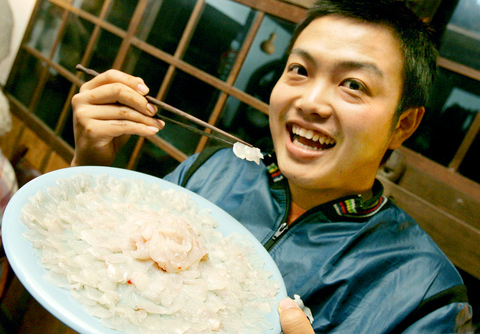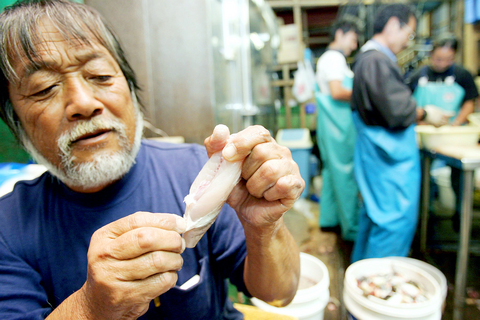Scientists in Singapore said they have uncovered the mystery of how the puffer fish survives despite the deadly poison in its body.
Research by the Institute of Molecular and Cell Biology and National University of Singapore showed the toxin, which is 20 times more deadly than cyanide, helps the fish to breed and defend itself against predators.
A process known as "evolutionary adaptation" allows it to become immune to the tetrodotoxin poison which comes from the food it eats, primarily marine life contaminated with the toxin.

PHOTO: EPA
"The scientists believe that besides helping to act as a defense against predators, tetrodotoxin resistance has allowed puffer fishes to selectively feed on tetrodotoxin-containing food items which other fish avoid."
It is also the toxin that female puffer fish use to attract their male counterparts during spawning.
The poisonous puffer fish is a highly prized delicacy in Japanese cuisine despite its lethal sting. In Japan, specialist chefs are trained in the art of removing the poison before serving the dish.

PHOTO: EPA
Black-and-white bacteria
Biologists say they have created a "living photographic film," made out of engineered intestinal bacteria, that is capable of taking high-resolution black-and-white pictures.
In a study published on Thursday in Nature, the weekly British science weekly, a team led by Christopher Voigt at the University of California at San Francisco started by extracting a light-sensing gene from a germ called a cyanobacterium.
They then stitched the gene into the cell membranes of Escherichia coli bateria, so that exposure to red light switched off a gene called lacZ that controls production of the bug's black pigment.
As a result, black-and-white images can be "stencilled" onto a mat of the engineered bacteria grown on a plate of protein-rich lab gel.
And because the screen's definition is on bacterial scale -- at up to 100 million pixels per square inch (2.5cm2) -- the resolution and tone scale are extraordinarily good.
Newton 1, Einstein 0
Albert Einstein may have made the discoveries that led to nuclear and solar power, lasers and even a physical description of space and time, but Sir Isaac Newton had a greater impact on science and mankind, according to a poll published last week.
Newton, the 17th-century English scientist most famous for describing the laws of gravity and motion, beat Einstein in two polls conducted by eminent London-based scientific academy, the Royal Society.
More than 1,300 members of the public and 345 Royal Society scientists were asked separately which famous scientist made a bigger overall contribution to science, given the state of knowledge during his time, and which made a bigger positive contribution to humankind.
Newton was the winner on all counts, though he beat the German-born Einstein by only 0.2 of a percentage point (50.1 percent to 49.9 percent) in the public poll on who made the bigger contribution to mankind.
The margin was greater among scientists: 60.9 percent for Newton and 39.1 percent for Einstein.
A roadmap for ants
Ants scouting for food place a tiny scent marker on branches that do not lead to a reward, according to a study published by Nature, the weekly British science weekly.
The pheromone acts like a "no-entry signal" to other ants, telling them not to waste their time going down that route, it says.
The discovery was made by animal scientists at Britain's University of Sheffield.
In a lab, they got a scouting colony of Pharaoh ants (Monomorium pharaonis) to explore branches that led to no reward. Paper covers were placed at the branch's forks.
The paper covers were then taken off and transferred to another set of branches. This set had already been explored by another ant colony, which found a tasty meal of sucrose at the end of the trail.
Even though the food reward was still there, ants performed a U-turn or chose another direction whenever they came across the covers.
"It provides advance warning, like human road signs situated before junctions," the authors suggest. -- agencies

On April 26, The Lancet published a letter from two doctors at Taichung-based China Medical University Hospital (CMUH) warning that “Taiwan’s Health Care System is on the Brink of Collapse.” The authors said that “Years of policy inaction and mismanagement of resources have led to the National Health Insurance system operating under unsustainable conditions.” The pushback was immediate. Errors in the paper were quickly identified and publicized, to discredit the authors (the hospital apologized). CNA reported that CMUH said the letter described Taiwan in 2021 as having 62 nurses per 10,000 people, when the correct number was 78 nurses per 10,000

As we live longer, our risk of cognitive impairment is increasing. How can we delay the onset of symptoms? Do we have to give up every indulgence or can small changes make a difference? We asked neurologists for tips on how to keep our brains healthy for life. TAKE CARE OF YOUR HEALTH “All of the sensible things that apply to bodily health apply to brain health,” says Suzanne O’Sullivan, a consultant in neurology at the National Hospital for Neurology and Neurosurgery in London, and the author of The Age of Diagnosis. “When you’re 20, you can get away with absolute

May 5 to May 11 What started out as friction between Taiwanese students at Taichung First High School and a Japanese head cook escalated dramatically over the first two weeks of May 1927. It began on April 30 when the cook’s wife knew that lotus starch used in that night’s dinner had rat feces in it, but failed to inform staff until the meal was already prepared. The students believed that her silence was intentional, and filed a complaint. The school’s Japanese administrators sided with the cook’s family, dismissing the students as troublemakers and clamping down on their freedoms — with

As Donald Trump’s executive order in March led to the shuttering of Voice of America (VOA) — the global broadcaster whose roots date back to the fight against Nazi propaganda — he quickly attracted support from figures not used to aligning themselves with any US administration. Trump had ordered the US Agency for Global Media, the federal agency that funds VOA and other groups promoting independent journalism overseas, to be “eliminated to the maximum extent consistent with applicable law.” The decision suddenly halted programming in 49 languages to more than 425 million people. In Moscow, Margarita Simonyan, the hardline editor-in-chief of the